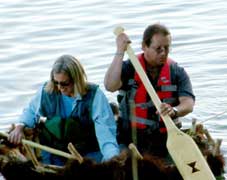|
Bay Reflections
 From Big Muddy to Our Great Shellfish Bay From Big Muddy to Our Great Shellfish Bay
by Albert 'Abby' Ybarra
I stood on the banks of the Missouri River, an ancient river that still provides life-giving resources for many, as it has for centuries. Big Muddy has experienced many changes over the years, but the natural beauty along the banks makes it hard to ignore. I was immediately drawn into its powerful force.
Only a few feet away from a once-great Mandan Village (Sacagawea's people of the Lewis and Clark fame), I stood in my bare feet on the river's edge as the muddy banks soothed my feet with cool running water. Times hundreds of years ago filled my eyes. I could see and sense the great people who once walked where I stood. Overhead, a golden eagle kept a watchful eye on me and the small group of teachers who had gathered at this place to take in the wonder and beauty of a place rich in history and environmental treasures.
The Missouri remains an awesome sight: expansive scenery, so much color and natural beauty and a habitat that continues to provide for so many living things. It's not hard to understand why the original native tribes settled on its banks. The Mandan-Hidatsa-Arikara people endured in this place for hundreds of years until contact with Europeans and new Americans nearly wiped them out in the early 1800s.
In the years since, we've nearly wiped out the river, too. The challenges are great for this once glorious river. Dam projects to make way for farming and commerce plus overdrawing by thirsty metropolitan populations have the river at historically low water levels.
Much as on Chesapeake Bay and the rivers that feed into it, human contact and overuse have devastated the habitat and all that depends on it for life. Battles are fought over enforcing regulations and implementing new operating instructions.
On both the Missouri River and Chesapeake Bay, we understand today far better how our natural systems operate. Having wet my feet in both great waters, I wonder why their legislature hasn't made industrial-strength regulations to stop devastating activities and restore these national treasures. I wonder why national leaders plan to eliminate Clean Water Act protections for about 20 percent of the nation's wetlands, streams and other waters.
As I stood on the banks of the Missouri River, I heard and distinctly remember natural music being played. The river sang a glorious song along with the birds in an unforgettable chorus. This is a beautiful river; this is our home, why can't we live together? they sang.
The challenge of our times is a huge one: How to live with our past, today - and tomorrow.
Albert 'Abby' Ybarra, a descendent of Mexican Indian and Native American ancestors, reflects from Chesapeake Beach.
|
